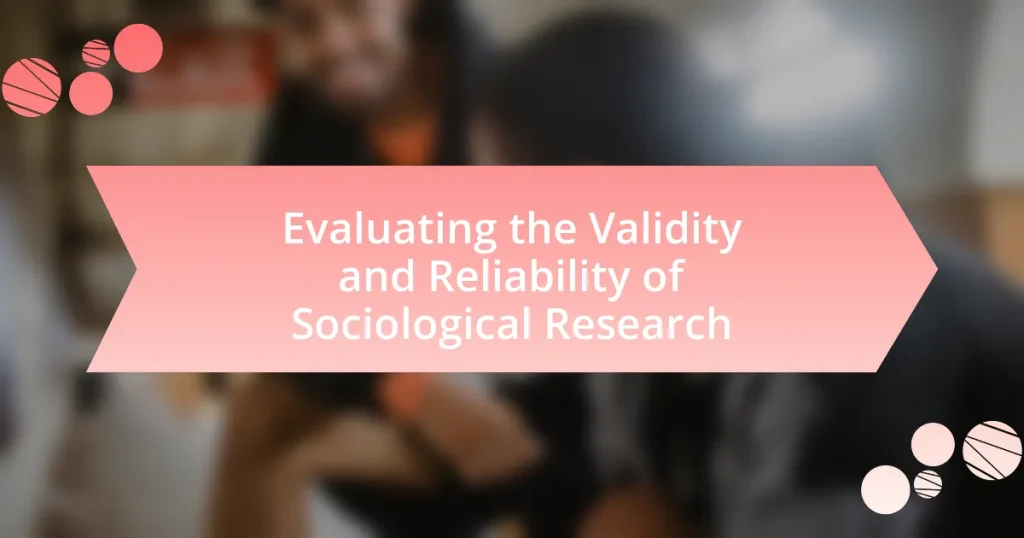The article focuses on evaluating the validity and reliability of sociological research, essential components that ensure the accuracy and consistency of research findings. It defines validity as the degree to which research accurately measures what it intends to, while reliability refers to the consistency of results across different contexts and times. The discussion includes various types of validity, such as internal and external validity, and types of reliability, including test-retest and inter-rater reliability. Additionally, the article addresses the challenges researchers face in maintaining these standards, common pitfalls that can undermine validity, and best practices to enhance both validity and reliability in sociological studies.

What is the validity and reliability of sociological research?
The validity of sociological research refers to the accuracy and truthfulness of the findings, indicating whether the research measures what it claims to measure. Reliability, on the other hand, pertains to the consistency of the research results over time and across different contexts. For instance, a study that consistently produces the same results under similar conditions demonstrates high reliability. Research methodologies, such as surveys and experiments, are evaluated for both validity and reliability through various statistical tests and peer reviews, ensuring that findings are credible and can be generalized to broader populations.
Why are validity and reliability important in sociological research?
Validity and reliability are crucial in sociological research because they ensure that the findings accurately represent the social phenomena being studied and can be consistently reproduced. Validity refers to the extent to which a research instrument measures what it is intended to measure, while reliability pertains to the consistency of the measurement across different instances. For example, a study measuring social attitudes must accurately reflect those attitudes (validity) and yield similar results when repeated (reliability). Research by Campbell and Fiske (1959) highlights that without these qualities, the conclusions drawn from sociological studies may be misleading, undermining the credibility of the research and its implications for policy and practice.
What do validity and reliability mean in the context of sociological studies?
Validity in sociological studies refers to the extent to which a study accurately measures what it intends to measure, ensuring that the findings are relevant and applicable to the real-world context. Reliability, on the other hand, pertains to the consistency of a study’s results over time and across different populations or settings, indicating that similar results would be obtained if the study were repeated under the same conditions. For instance, a survey measuring social attitudes should yield similar results if administered to the same group at different times, demonstrating reliability, while also accurately reflecting those attitudes, demonstrating validity.
How do validity and reliability impact research outcomes?
Validity and reliability significantly impact research outcomes by ensuring that the findings accurately represent the phenomena being studied and can be consistently reproduced. Validity refers to the extent to which a research instrument measures what it is intended to measure, while reliability pertains to the consistency of the measurement across different instances. For example, a study measuring educational achievement must accurately assess knowledge (validity) and yield similar results when repeated (reliability). Research indicates that high validity and reliability lead to more credible and generalizable results, as demonstrated in a meta-analysis by Hattie (2009), which found that reliable assessments correlate strongly with valid educational outcomes. Thus, the integrity of research outcomes hinges on both validity and reliability.
What types of validity are recognized in sociological research?
Sociological research recognizes several types of validity, including internal validity, external validity, construct validity, and criterion-related validity. Internal validity refers to the extent to which a study accurately establishes a causal relationship between variables, ensuring that observed effects are due to the manipulation of the independent variable rather than confounding factors. External validity pertains to the generalizability of study findings to other settings, populations, or times. Construct validity assesses whether a test or instrument accurately measures the theoretical construct it is intended to measure. Criterion-related validity evaluates how well one measure predicts an outcome based on another measure. Each type of validity is crucial for ensuring the credibility and applicability of sociological research findings.
What is internal validity and why is it crucial?
Internal validity refers to the extent to which a study accurately establishes a causal relationship between variables, ensuring that the observed effects are due to the manipulation of the independent variable rather than other factors. It is crucial because high internal validity strengthens the credibility of the research findings, allowing researchers to confidently attribute changes in the dependent variable to the independent variable. For instance, in a controlled experiment, if a researcher finds that a specific intervention leads to improved outcomes, high internal validity confirms that this improvement is likely a direct result of the intervention, rather than external influences or confounding variables. This reliability is essential for drawing valid conclusions and making informed decisions based on the research.
How does external validity affect the generalizability of findings?
External validity directly influences the generalizability of findings by determining the extent to which research results can be applied to settings, populations, or times beyond the specific conditions of the study. High external validity indicates that the findings are likely applicable to a broader context, while low external validity suggests limitations in how the results can be interpreted in different scenarios. For instance, a study conducted on a specific demographic may yield results that are not applicable to other groups, thereby limiting the generalizability of those findings. Research by Campbell and Stanley (1966) emphasizes that external validity is crucial for understanding how well research outcomes can be extrapolated to real-world situations, reinforcing the importance of considering external factors when evaluating sociological research.
What types of reliability are essential in sociological research?
In sociological research, the essential types of reliability include internal reliability, external reliability, and test-retest reliability. Internal reliability refers to the consistency of results across items within a test or measurement, ensuring that different parts of the assessment yield similar results. External reliability pertains to the consistency of results across different contexts or populations, indicating that findings can be generalized. Test-retest reliability involves measuring the stability of results over time, confirming that repeated measurements yield consistent outcomes. These types of reliability are crucial for establishing the credibility and validity of sociological findings, as they ensure that research outcomes are dependable and replicable.
What is test-retest reliability and how is it measured?
Test-retest reliability is a measure of the consistency of a psychological test or assessment over time. It is assessed by administering the same test to the same group of individuals at two different points in time and then calculating the correlation between the two sets of scores. A high correlation coefficient, typically above 0.7, indicates strong test-retest reliability, suggesting that the test produces stable and consistent results across different occasions. This method is widely used in sociological research to ensure that the instruments used for data collection yield reliable results over time.
How does inter-rater reliability contribute to research consistency?
Inter-rater reliability enhances research consistency by ensuring that different raters or observers produce similar results when assessing the same phenomenon. This consistency is crucial in sociological research, as it minimizes subjective bias and increases the credibility of the findings. For instance, a study published in the “Journal of Educational Psychology” by McMillan and Schumacher (2010) demonstrated that high inter-rater reliability scores correlate with more reliable and valid research outcomes. By quantifying the degree of agreement among raters, researchers can confidently assert that their findings are not merely artifacts of individual interpretation, thereby reinforcing the overall integrity of the research.

How can researchers assess the validity and reliability of their studies?
Researchers can assess the validity and reliability of their studies by employing various methodological strategies. Validity can be evaluated through techniques such as content validity, construct validity, and criterion-related validity, which ensure that the study measures what it intends to measure. Reliability can be assessed using methods like test-retest reliability, inter-rater reliability, and internal consistency, which confirm that the results are consistent across different instances and observers. For example, a study published in the “Journal of Educational Psychology” by Cronbach (1951) established the importance of internal consistency in reliability assessment, demonstrating that a high Cronbach’s alpha indicates reliable measurement.
What methods are used to evaluate validity in sociological research?
Methods used to evaluate validity in sociological research include content validity, construct validity, and criterion-related validity. Content validity assesses whether a measure represents all facets of a given construct, often evaluated through expert judgment. Construct validity examines whether a test truly measures the theoretical construct it claims to measure, supported by correlational studies and factor analysis. Criterion-related validity involves comparing the measure with an external criterion, demonstrating predictive or concurrent validity through statistical correlation. These methods ensure that sociological research accurately reflects the concepts being studied, enhancing the credibility and applicability of findings.
How can researchers ensure construct validity in their studies?
Researchers can ensure construct validity in their studies by clearly defining and operationalizing the constructs they intend to measure. This involves developing precise measurement tools that accurately reflect the theoretical concepts, ensuring that the instruments capture the intended constructs without contamination from unrelated variables. For example, using established scales with demonstrated reliability and validity, such as the Beck Depression Inventory for measuring depression, provides a concrete basis for assessing construct validity. Additionally, conducting pilot studies can help refine measurement tools and confirm that they align with the theoretical framework.
What role do pilot studies play in assessing validity?
Pilot studies play a crucial role in assessing validity by allowing researchers to test their methodologies and instruments on a smaller scale before full implementation. This preliminary testing helps identify potential issues, such as unclear questions or inadequate sampling methods, which could compromise the validity of the main study. For instance, a pilot study can reveal whether the survey questions effectively capture the intended constructs, thereby ensuring that the data collected in the larger study will be valid and reliable. By addressing these concerns early, researchers can refine their approaches, ultimately enhancing the overall validity of their sociological research.
What strategies can enhance the reliability of sociological research?
To enhance the reliability of sociological research, employing multiple methods of data collection is essential. Utilizing triangulation, which involves gathering data through various sources or methods, can significantly reduce bias and improve the consistency of findings. For instance, combining qualitative interviews with quantitative surveys allows researchers to cross-verify results, thereby increasing the robustness of the conclusions drawn. Additionally, ensuring a representative sample enhances reliability, as it allows for generalization of findings to a broader population. Research by Creswell and Plano Clark (2011) in “Designing and Conducting Mixed Methods Research” supports this approach, demonstrating that mixed methods yield more reliable outcomes than single-method studies.
How can standardized procedures improve reliability?
Standardized procedures improve reliability by ensuring consistency in data collection and analysis across different studies. This consistency minimizes variability caused by differing methodologies, which can lead to more accurate and replicable results. For instance, research conducted by the American Psychological Association indicates that standardized protocols in psychological testing yield higher reliability scores compared to non-standardized methods. By adhering to established guidelines, researchers can reduce biases and errors, thereby enhancing the overall trustworthiness of their findings.
What is the significance of using established measurement tools?
The significance of using established measurement tools lies in their ability to enhance the validity and reliability of sociological research. Established measurement tools are rigorously tested and standardized, ensuring that they accurately capture the constructs they are intended to measure. For instance, tools like surveys and questionnaires that have undergone extensive validation processes provide consistent results across different populations and contexts. This consistency is crucial for researchers to draw meaningful conclusions and make informed decisions based on their findings. Furthermore, using these tools allows for comparability across studies, facilitating meta-analyses and broader generalizations within the field of sociology.

What challenges do researchers face in ensuring validity and reliability?
Researchers face significant challenges in ensuring validity and reliability due to factors such as measurement errors, sampling biases, and external influences. Measurement errors can arise from poorly designed instruments or subjective interpretations, which compromise the accuracy of data collection. Sampling biases occur when the sample does not accurately represent the population, leading to skewed results that affect generalizability. Additionally, external influences, such as social desirability bias or environmental factors, can distort responses and impact the consistency of findings. These challenges highlight the complexity of maintaining rigorous standards in sociological research, as evidenced by studies indicating that up to 30% of research findings may be affected by such biases, ultimately questioning the robustness of conclusions drawn from the data.
What common pitfalls can undermine validity in sociological research?
Common pitfalls that can undermine validity in sociological research include sampling bias, measurement error, and researcher bias. Sampling bias occurs when the sample does not accurately represent the population, leading to skewed results; for example, if a study on voting behavior only surveys urban residents, it may not reflect rural perspectives. Measurement error arises when the tools or methods used to collect data do not accurately capture the intended variables, such as using poorly designed surveys that confuse respondents. Researcher bias can influence the interpretation of data, as researchers may consciously or unconsciously favor outcomes that align with their hypotheses or beliefs, potentially distorting findings. These pitfalls can significantly compromise the integrity of sociological research, making it essential to address them rigorously.
How can researcher bias affect study outcomes?
Researcher bias can significantly distort study outcomes by influencing data collection, analysis, and interpretation. When researchers have preconceived notions or preferences, they may consciously or unconsciously select data that supports their hypotheses while disregarding contradictory evidence. For instance, a study published in the Journal of Personality and Social Psychology found that researchers’ expectations can shape the results of their experiments, leading to skewed conclusions. This bias can compromise the validity and reliability of sociological research, as it undermines objectivity and can result in misleading findings that do not accurately reflect the studied phenomena.
What are the implications of sample size on validity?
Sample size significantly impacts the validity of sociological research by influencing the representativeness of the sample and the statistical power of the analysis. A larger sample size generally enhances the ability to generalize findings to the broader population, reducing sampling error and increasing the reliability of the results. For instance, a study with a sample size of 1,000 participants is more likely to yield valid conclusions about a population than a study with only 30 participants, as the latter may not adequately capture the diversity within the population. Additionally, larger samples provide greater statistical power, which is the likelihood of detecting an effect if there is one, thereby reducing the risk of Type II errors. Research by Cohen (1988) indicates that sample sizes should be calculated based on the expected effect size, desired power, and significance level to ensure valid results. Thus, inadequate sample sizes can lead to misleading conclusions and undermine the overall validity of sociological research.
What factors can threaten the reliability of sociological research?
Factors that can threaten the reliability of sociological research include sampling bias, measurement error, and researcher bias. Sampling bias occurs when the sample does not accurately represent the population, leading to skewed results. For instance, if a study on social behavior only includes participants from a specific demographic, the findings may not be generalizable. Measurement error arises when the tools or methods used to collect data are flawed, which can distort the results; for example, poorly designed surveys can lead to inaccurate responses. Researcher bias happens when the researcher’s expectations or beliefs influence the study’s outcomes, potentially affecting data interpretation. These factors collectively undermine the reliability of sociological findings, making it crucial for researchers to implement rigorous methodologies to mitigate such threats.
How does participant variability influence reliability?
Participant variability directly influences reliability by introducing inconsistencies in responses and behaviors across different individuals in a study. When participants exhibit diverse characteristics such as age, gender, socioeconomic status, or cultural background, these differences can lead to variations in how they interpret questions or engage with the research context. For instance, a study measuring stress levels may yield different results based on participants’ varying coping mechanisms, which can skew the overall findings. Research indicates that higher participant variability often correlates with lower reliability scores, as seen in meta-analyses where standardized measures showed reduced consistency in outcomes when diverse populations were included. Thus, controlling for participant variability is essential to enhance the reliability of sociological research findings.
What impact does data collection method have on reliability?
Data collection methods significantly impact the reliability of research findings. Reliable data collection methods, such as structured surveys or controlled experiments, yield consistent results across different contexts and populations, enhancing the trustworthiness of the data. Conversely, unstructured methods, like open-ended interviews, may introduce variability and subjectivity, leading to inconsistent outcomes. Research by Creswell and Creswell (2017) in “Research Design: Qualitative, Quantitative, and Mixed Methods Approaches” demonstrates that systematic approaches to data collection improve reliability by minimizing biases and errors, thereby ensuring that the findings can be replicated and validated in future studies.
What best practices can researchers follow to improve validity and reliability?
Researchers can improve validity and reliability by employing rigorous methodological designs, such as randomized controlled trials and longitudinal studies. These designs minimize biases and enhance the accuracy of findings. Additionally, using validated measurement instruments ensures that the constructs being studied are accurately captured, which further supports the validity of the research. For instance, employing established surveys with proven reliability coefficients, such as Cronbach’s alpha above 0.7, can enhance the consistency of the results. Furthermore, conducting pilot studies allows researchers to refine their instruments and procedures, thereby increasing the overall reliability of the research. Lastly, triangulating data sources by using multiple methods or perspectives can provide a more comprehensive understanding of the phenomenon, thereby enhancing both validity and reliability.
How can thorough literature reviews enhance research quality?
Thorough literature reviews enhance research quality by providing a comprehensive understanding of existing knowledge and identifying gaps in the literature. This process allows researchers to build upon previous studies, ensuring that their work is grounded in established theories and findings. For instance, a systematic review can reveal methodological strengths and weaknesses in prior research, guiding new studies to adopt more robust approaches. Additionally, literature reviews help in refining research questions and hypotheses, as they highlight areas that require further exploration. By synthesizing diverse perspectives, thorough literature reviews contribute to a more nuanced interpretation of data, ultimately leading to more reliable and valid sociological research outcomes.
What role does peer review play in validating research findings?
Peer review plays a critical role in validating research findings by ensuring that studies undergo rigorous evaluation by experts in the field before publication. This process helps to identify methodological flaws, biases, and inaccuracies, thereby enhancing the credibility of the research. Studies published in peer-reviewed journals are generally considered more reliable because they have met established academic standards, as evidenced by the fact that peer-reviewed articles are often cited more frequently than non-peer-reviewed ones, indicating their acceptance and trust within the scientific community.
